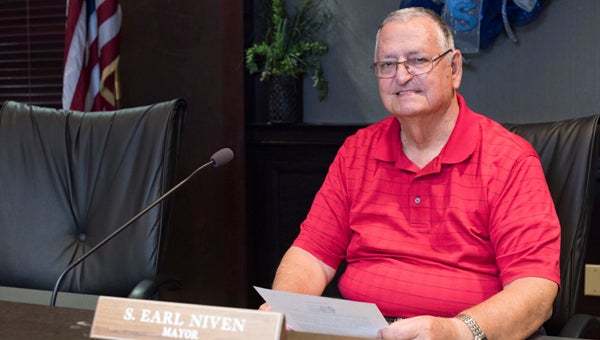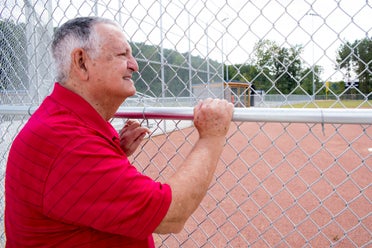Motion to adjourn: Mayor Earl Niven preparing for life after office
Published 2:32 pm Wednesday, August 31, 2016

Chelsea Mayor Earl Niven is nearing the end of his last term as the city’s only mayor. Niven’s 20-year tenure started when Chelsea was incorporated in 1996. (Reporter Photo/Keith McCoy)
By EMILY SPARACINO / Staff Writer
CHELSEA – Life will look a bit different for Mayor Earl Niven in two months.
Niven, 73, is nearing the end of his fifth consecutive term as Chelsea’s first and only mayor, a distinction he will carry with him as he packs up two decades of materials and memories in his office at City Hall.
“This has been a journey,” Niven said in an Aug. 18 interview.
For Niven and many others who were involved in efforts to incorporate Chelsea 20 years ago, the journey has produced setbacks and victories that have shaped the city’s past and mapped a course for its future.
Niven has played an active role in many firsts in Chelsea’s history, including the first election of town officials and the first town council meeting.
And this year, for the first time, Niven’s name was not on the ballot for re-election.
“My memory goes back to that night I took the oath of office,” Niven said, adding he was “nervous” not knowing what would happen next, and not having a precedent for overseeing a city.
Niven and the outgoing council will be finished with their terms when the new mayor and council are sworn in Monday, Nov. 7.
Until then, Niven will continue fulfilling his daily responsibilities, working on capital projects and helping the incoming mayor acclimate to the job before he takes office.
The impending retirement of a young city’s first and only mayor presents a good opportunity to look back at the city’s history, and his place in it.
CHELSEA’S ROOTS RUN DEEP
Although Chelsea’s incorporation was a pivotal event, the city’s history extends far beyond a 20-year span.
In “Early Settlers of the K-Springs/Chelsea Area” by Shelba Shelton Nivens, the story starts with Coalville, which derived its name from a coalmine in the area.
“An item in a 1912 newspaper (Shelby County Sun, Sept. 12, 1912 edition), informed the people of the county that a Mr. J.W. Dillard, representative of Mt. Vernon Coal Mine Company, had opened a coalmine at Chelsea on the A B & A Railroad,” Nivens wrote.
According to the book, Chelsea is not on a U.S. Geological Survey Topographic Map from 1906. At the time, the Columbiana Road (present-day Shelby County 47) ran from Lester Chapel northwestward to Coalville instead of Chelsea.
When the railroad was established in the area circa 1908, many families and businesses moved closer to the line, signaling the formation of the town of Chelsea, or “Melrose” as it was first called.
Fast-forward about 80 years, and the incorporation history begins.
The town of Chelsea was first incorporated in May 1995, but in December, the incorporation was declared “null and void.” Chelsea was incorporated again in March 1996.
A 2011 bound publication titled “Incorporation History of Chelsea, Alabama” details the events that transpired from 1995 to 1996 regarding residents’ incorporation efforts.
The publication came after councilwoman Juanita Champion “expressed a wish to have a written record of this early history for the new Chelsea museum.”
Champion contacted members of the original organizing group – the Chelsea Incorporation Committee – to work together on the publication. Tim Crawford, Jay Jerman, Chuck Lewis, Bobbie Rich, Rita Smith and Bob Wanninger were among the members. Leonard Griffin and Carol Beavers contributed to the project, and Niven joined the group after he was elected to office.
In 1991, Hub Harrington, then-mayor of Indian Springs Village (incorporated in 1990), met opposition from “a vocal minority” when he spoke to residents at a community meeting about the legal requirements of incorporation. But this was not a dead end for later efforts.
On Jan. 28, 1995, seventy names were placed on a sign-up sheet titled “People interested in Chelsea Incorp.” after a community meeting, at which concerns surfaced about Pelham potentially building a fire station next to Chelsea High School and annexing the school into Pelham city limits.
The members of the incorporation committee, also known as the “Vote ‘FOR’ Chelsea Committee,” came together to protect Chelsea and its land––and projected tax base––along U.S. 280, voluntarily, without financial compensation. Members and other residents went door-to-door throughout the proposed town limits to collect signatures on incorporation petition forms, according to the 2011 publication.
“We had probably the closest group of people working to incorporate,” Niven said. “We had to have unity.”
The committee’s and volunteers’ efforts culminated in 27 petition forms with residents’ signatures, plus four forms with signatures of non-residents who owned property in the incorporation area and signatures of official representatives of institutions that owned property in the area. In all, the forms held 369 signatures of eligible voters, more than the minimum number, and the 15 percent, required.
Then-Shelby County Probate Judge Patricia Fuhrmeister ordered a special incorporation election for Chelsea to be held May 9, 1995.
Prior to the election, people opposed to incorporation formed the “Concerned Citizens of Chelsea” group and expressed concerns about higher taxes and restrictive zoning resulting from the change.
Fuhrmeister appointed Carol Beavers, Rich and Smith to conduct a census, which revealed there were 896 individuals and 323 households in the proposed city of Chelsea.
Fuhrmeister then issued the “Order of Incorporation, Chelsea,” on May 16, 1995, creating the town of Chelsea.
But opposition persisted. A group of people against incorporation secured an attorney to take legal action, claiming the petition for incorporation did not meet requirements of the law in that it was not signed by at least four registered voters in each quarter-quarter section of affected property.
Sure enough, a surveyor found one of the houses originally thought to be in one quarter-quarter was actually in the adjoining one, meaning the quarter-quarter didn’t have the required number of voters.
The step backward prompted the incorporation committee, elected officials like Niven and other residents to pool their efforts and try again.
In a second incorporation election held Feb. 27, 1996, 279 people voted in favor and 24 against incorporation.
A second census conducted showed 906 individuals lived in 326 homes in the proposed city limits of Chelsea.
After Chelsea was officially re-incorporated, a second election of town officials was held. Niven was unopposed for mayor, and Glen Autry Jr., Earlene Isbell and Shelby Blackerby were unopposed for council seats. Bob Combs and John Ritchie topped their respective opponents for the other two seats.
“Our main concern when we started out was annexation,” Niven said. “We wanted to annex to protect our city, the 280 area and the high school. Without 280, we would have no financial resources for the development of our city.”
On March 1, 1996, Chelsea was declared a municipality after roughly 93 percent of people voted in favor of incorporating, Niven said.
“Unity is what got us back to a city,” he said. “Now, we find ourselves one of the best cities in the state of Alabama. It’s because of hard work.”
PASSING THE GAVEL
Completion of Chelsea’s new sports complex off Shelby County 11 and preparation of the city’s budget are among Niven’s highest priorities before he leaves office.
The sports complex should be open in September, he said, and the general budget will need to be ready for the new fiscal year starting Oct. 1.

Completing Chelsea’s new sports complex off Shelby County 11 is one of Niven’s priorities before he leaves office. The complex is slated to open in September. (Reporter Photo/Keith McCoy)
Niven plans to talk to the incoming mayor about the city’s finances, with which he took an active role throughout his time as mayor.
“I’m a numbers person, and I think that’s one of the areas I benefited the city,” he said. “I will go over how I develop the budget with each department. The general budget is not all that complicated because you want to make sure the operational expenses are covered. Capital is where more involvement comes.”
His advice for the new mayor is simple: Take your time and study municipal code materials to understand what the mayor and council can and cannot do.
“I hope they don’t automatically think they have to have something promised in their campaign in a week,” Niven said. “They need to come in and get training from the Alabama League of Municipalities, and study that manual. The first six months to a year is a learning curve.”
An issue Niven said he would like to have seen resolved during his tenure – and an issue multiple mayor and council candidates included in their campaigns this year – is the intersection of Shelby County 47 and Shelby County 39, adding “time and money issues” have delayed a re-routing project.
Niven said he is proud of the city’s relationship with, and long-standing support of, its schools.
Seventeen years ago, the city started donating $10,000 to each school, and currently donates $125,000 to local schools on a yearly basis. The city has given $2,475,000 total to schools over the past 17 years, he said.
“I’m proud of being the mayor of a city that cares for kids,” he added.
Niven’s days at City Hall are filled with telephone calls, meetings, paperwork and school or community event appearances, but “no two days are exactly the same.”
A 5 p.m. arrival time at home each day is not guaranteed; however, he has made a point to schedule family time into regular workdays for his wife, June, and others close to him.
“I’m a family person, and one of the things I love about being mayor is that gives me an opportunity to have lunch with my wife and maybe kids and grandkids,” he said. “My wife has sacrificed greatly, with me not being home. No one has a better wife than I do.”
Though Niven is looking forward to traveling more and working with the senior adults at his home church, Liberty Baptist Church, he admitted the end of his time as mayor is bittersweet.
“I will miss the day-to-day coming in contact with people. I love to tell people about Chelsea,” he said. “It’s the people and the interaction of what the city can do for the people of our community that I’ll miss.”
He is certain, however, that Chelsea is on the cusp of more development, more progress, more steady leadership under which the city, where “it’s all about family,” can continue to flourish.
“I want this to be a smooth transition,” Niven said. “Our goal in life is always leave a place better than when you get there. We have had great days in the city, but the greatest days are ahead of us. I am convinced of that.”









